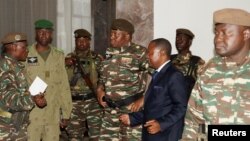Niger's coup leaders said late Sunday that they are ready to "prosecute" ousted Nigerien President Mohamed Bazoum for "high treason" and "undermining the security" of the country.
The United States, United Nations and West African leaders condemned the move, calling it a further sign that the junta is unwilling to seek a peaceful route out of the crisis.
"It's obviously a very worrying declaration," said U.N. spokesperson Stephanie Dujarric. "We remain extremely concerned about the state of being, the health and safety of the president and his family. And again, we call for his immediate and unconditional release, and his reinstatement as head of state, of course," he added.
West Africa's main regional bloc ECOWAS expressed shock Monday to learn about the military junta's plans for the democratically elected Nigerien president.
The move is viewed as a provocation by Niger's coup leaders and contradicts their reported willingness to find a peaceful solution to the current crisis, the bloc said in a statement.
Junta spokesperson Colonel Major Amadou Abdramane, speaking on state television, said the military regime had "gathered the necessary evidence to prosecute before the competent national and international authorities the ousted president and his local and foreign accomplices for high treason and for undermining the internal and external security of Niger."
Hours earlier, Niger's junta leaders said they were open to negotiations to avert conflict with the Economic Community of West African States (ECOWAS), according to a group of senior Nigerien Islamic scholars who met with the military insurgents Sunday in Niamey.
ECOWAS is mulling how to restore civilian rule in Niger, and how to reinstate Bazoum, who was ousted in the military takeover last month.
Although ECOWAS has threatened military intervention in Niger, it appears reluctant to deploy troops there, fearing that such a move could plunge Niger into civil war.
Any military intervention by the bloc could further strain regional ties as juntas in Mali, Burkina Faso, and Guinea have expressed support for Niger's military rule.
Pursuing a peaceful resolution, ECOWAS chairman and Nigerian President Bola Tinubu approved the clerical diplomatic mission in Niger.
Ulf Laessing is head of the Sahel program at the Konrad Adenauer Foundation, a research group headquartered in Germany. He said Niger's junta seems to be cementing its rule. "It looks as though the putschists have won and will stay," he noted.
Europe and the United States will have little choice but to recognize the junta to continue the security cooperation in the region, Laessing added.
The U.S. and France have more than 2,500 military personnel in the region and, together with other countries, have invested hundreds of millions of dollars in military assistance and training in Niger's forces.
The coup is seen as a blow to many Western nations. Niger is a top uranium producer and, until now, a Western ally in the fight against a growing jihadist insurgency linked to al-Qaida and the Islamic State group in the sub-Saharan Sahel region.
Boko Haram rebels have intensified their attacks in the area. At least 40,000 people have been killed and 2 million displaced in the 14-year insurgency which has spread to Niger, Chad and Cameroon.
Junta leader General Abdourahamane Tchiani, who named himself head of the transition government, has maintained the junta could be more effective at protecting the nation from jihadi violence.
Nigeriens in the capital, Niamey, said Friday ECOWAS has been out of touch with the political realities in Niger and that it shouldn't interfere.
"It is our business, not theirs. They don't even know the reason why the coup happened in Niger," resident Achirou Harouna Albassi told The Associated Press, adding that Bazoum was not abiding by the will of the people.
U.S. Secretary of State Antony Blinken said Washington appreciates "the determination of ECOWAS to explore all options for the peaceful resolution of the crisis" and would hold the junta accountable for the safety and security of Bazoum. He did not, however, specify whether the U.S. supported the deployment of ECOWAS troops.
Western powers fear Russian influence increasing if Niger follows neighboring Mali and Burkina Faso, both of which expelled troops of former colonial power France after coups in those countries.
Mali has since teamed up with mercenaries from the Russian-led Wagner Group and kicked out a United Nations peacekeeping force there, something security analysts say could lead to further conflict.
Bazoum family detained
Bazoum and his family are being held in the basement of their home. The president said he hasn't had electricity for days and isn't allowed to see family, friends or bring food supplies into the house.
He "had a visit by his doctor today," a member of the physician's team told Agence France-Presse on Saturday, adding the physician had also brought food for Bazoum, his wife, and son.
"He's fine, given the situation," the source added.
Fern Robinson contributed to this report. Some information in this report came from Reuters, The Associated Press, and Agence France-Presse.





Forum